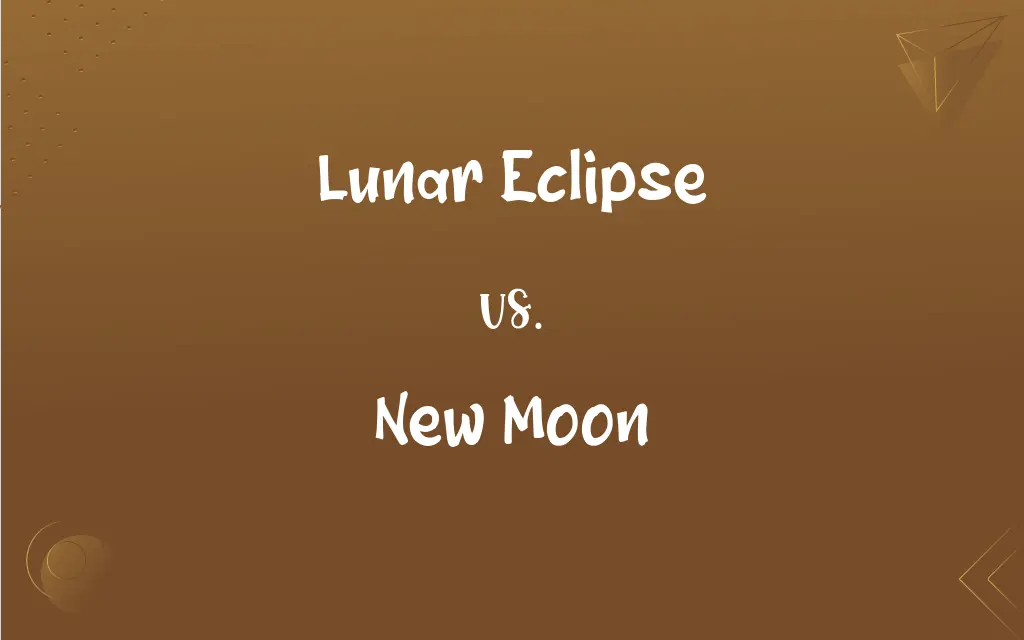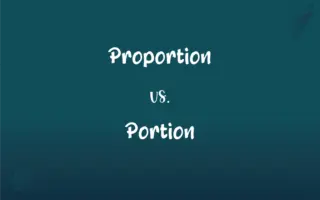Lunar Eclipse vs. New Moon: What's the Difference?
Edited by Aimie Carlson || By Harlon Moss || Updated on November 13, 2023
A lunar eclipse is when Earth's shadow blocks the Sun's light from the Moon; a new moon is when the Moon is between Earth and the Sun, invisible from Earth.

Key Differences
A lunar eclipse occurs when the Earth comes between the Sun and the Moon, casting a shadow on the Moon. During a new moon, the Moon is positioned between the Earth and the Sun, with the Sunlit side facing away from Earth.
In a lunar eclipse, the Earth's shadow can cause the Moon to appear reddish, known as a blood moon. In contrast, during a new moon, the Moon is not visible in the night sky, as its illuminated side is facing away from Earth.
Lunar eclipses happen less frequently than new moons and are visible from anywhere on the night side of Earth. New moons occur roughly every 29.5 days, marking the start of a new lunar cycle.
During a total lunar eclipse, the Moon can be completely obscured by Earth's shadow. However, a new moon signifies a time of renewal and is often associated with planting or starting new projects.
While a lunar eclipse is an event that attracts stargazers, a new moon often goes unnoticed due to the Moon's invisibility. Both, however, play significant roles in astronomy and cultural traditions.
ADVERTISEMENT
Comparison Chart
Visibility
Moon visible, often reddish
Moon invisible from Earth
Frequency
Less frequent
Occurs every 29.5 days
Position
Earth between Sun and Moon
Moon between Earth and Sun
Cultural Significance
Often seen as a special event
Associated with new beginnings
Astronomical Importance
Demonstrates Earth-Moon-Sun alignment
Marks the start of the lunar cycle
ADVERTISEMENT
Lunar Eclipse and New Moon Definitions
Lunar Eclipse
When the Moon passes through Earth's shadow.
Photographers captured amazing shots of the lunar eclipse.
New Moon
Phase when the Moon is between Earth and the Sun.
The new moon made the night sky particularly dark.
Lunar Eclipse
Can be total, partial, or penumbral.
We witnessed a partial lunar eclipse last night.
New Moon
The Moon is invisible from Earth.
The new moon phase occurs once every month.
Lunar Eclipse
A celestial event involving Earth, Moon, and Sun alignment.
The lunar eclipse was visible across many countries.
New Moon
A time often associated with new beginnings.
She started her project on the night of the new moon.
Lunar Eclipse
When Earth blocks sunlight from reaching the Moon.
The lunar eclipse created a stunning blood moon.
New Moon
Marks the start of a new lunar cycle.
Many cultures align their calendars with the new moon.
Lunar Eclipse
Occurs during a full moon phase.
The lunar eclipse made the night sky dramatic.
New Moon
When the illuminated side of the Moon faces away from Earth.
During the new moon, stargazing is often better.
FAQs
What's the difference between a solar and a lunar eclipse?
A solar eclipse happens when the Moon passes between the Earth and the Sun, blocking the Sun. A lunar eclipse occurs when the Earth's shadow falls on the Moon.
What is a lunar eclipse?
A lunar eclipse occurs when the Earth passes between the Sun and the Moon, casting a shadow on the Moon.
How often do lunar eclipses occur?
Lunar eclipses occur at least twice a year but can happen as many as five times in a year.
What are the types of lunar eclipses?
There are three types: penumbral, partial, and total lunar eclipses.
How long can a lunar eclipse last?
A total lunar eclipse can last up to 100 minutes, while the entire event, from the beginning to end, can last several hours.
Do lunar eclipses affect tides?
While the Moon affects tides, lunar eclipses themselves have no significant impact on them.
Why does the Moon turn red during a total lunar eclipse?
The Earth's atmosphere bends sunlight, allowing the red wavelengths to illuminate the Moon, creating a "blood moon."
When is the next lunar eclipse?
Specific dates vary from year to year. You can check eclipse calendars for precise dates.
Why don't we see a lunar eclipse every full moon?
Because the Moon's orbit is slightly tilted, it doesn't always align perfectly with the Earth and the Sun.
Why don't we have a solar eclipse every new moon?
Because of the tilt in the Moon's orbit, it doesn't always align perfectly with the Earth and Sun to cause an eclipse.
Does a new moon affect tides?
Yes. New moons, along with full moons, can result in higher tides called "spring tides."
Can you see stars more clearly during a new moon?
Yes. With less moonlight, stars and other celestial objects can appear more prominent.
Is it safe to watch a lunar eclipse with the naked eye?
Yes, it's completely safe to observe a lunar eclipse without any protective eyewear.
What is a new moon?
A new moon is the moon phase when the Moon is directly between the Earth and the Sun, making it mostly invisible from Earth.
Can you see a new moon in the sky?
Generally, no. The illuminated side of the Moon is facing away from Earth, making it nearly invisible.
Is a new moon the same as a dark moon?
While both terms refer to the Moon's phase where it's not visible from Earth, "dark moon" sometimes refers to the period when there's no sliver of the Moon visible, while "new moon" can refer to the very first visible crescent.
When is the next new moon?
Dates vary. You can check moon phase calendars for precise dates.
How often does a new moon occur?
A new moon occurs approximately once every 29.5 days.
What's the significance of a new moon in various cultures?
Many cultures associate the new moon with new beginnings, rituals, or festivals.
Is the new moon phase shorter or longer than other phases?
The phase duration is roughly the same for all moon phases, but the visibility of the new moon makes it seem shorter to observers on Earth.
About Author
Written by
Harlon MossHarlon is a seasoned quality moderator and accomplished content writer for Difference Wiki. An alumnus of the prestigious University of California, he earned his degree in Computer Science. Leveraging his academic background, Harlon brings a meticulous and informed perspective to his work, ensuring content accuracy and excellence.
Edited by
Aimie CarlsonAimie Carlson, holding a master's degree in English literature, is a fervent English language enthusiast. She lends her writing talents to Difference Wiki, a prominent website that specializes in comparisons, offering readers insightful analyses that both captivate and inform.






































































